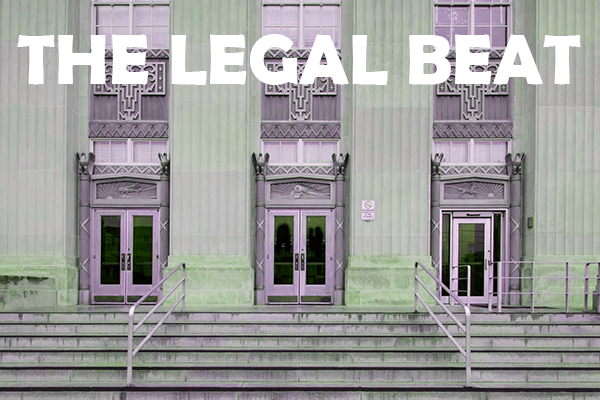|
RCBJ-Audible (Listen For Free)
|
Town of Ramapo Asserts Its First Amendment Right To Fly Israeli Flag; Moves To Dismiss Complaint Filed By Satmar Rabbi
The Legal Beat
“We’re going to represent you, pro bono,” a representative of Ropes & Gray, a law firm with 14 offices on three continents, and more than 1,500 legal professionals, told Ramapo Town Supervisor Michael Specht. “We think it’s an interesting case.”
The Town of Ramapo caught the attention of an elite New York City firm because the topic of flag flying is hot, controversial, and being widely debated at a time in history when a Middle East conflict is spilling into local communities across America, including Rockland County.
In March, a Satmar Rabbi filed a lawsuit in Rockland County Supreme Court charging the flying of the Israeli flag violates New York State law as well the First Amendment rights of Satmar Jews. In response, Ramapo is seeking to have the case dismissed. Ultimately, if the case is not dismissed, what’s at issue is whether government entities can fly a foreign flag, and perhaps whether the New York statute barring flag flying is constitutional.
Ramapo officials displayed the blue-and-white flag with a Star of David on Oct. 12 to show solidarity with the Jewish State following the terrorist group Hamas’s invasion and killing of Israeli citizens on October 7. New York State law, Section 141, Chapter 44, Article 5 of the New York Public Buildings law, prohibits flying a foreign flag on a government building. The statute reads: “It shall not be lawful to display the flag or emblem of any foreign country upon any state, county, or municipal building.”
The statute makes an exception when a public official makes a proclamation to display the flag when a foreigner visits a municipality as a public guest.
In the aftermath of the Hamas attack, Ramapo hoisted the flag without issuing a proclamation — it only did so two months later in December. The Satmars had continued to demand that Ramapo remove the flag. Among the Satmar Hasidic community, there is widespread opposition to the State of Israel or the public use or display of any of its symbols including the flag and the Star of David. The Satmars made two requests in February to Specht to remove the flag, unsuccessfully. The town had already attached a proclamation, which it says satisfies New York Law.
The plaintiff disagrees, arguing the proclamation was issued more than two months after the flag was first posted and the purported reason for the display of the flag fails to indicate that those it seeks to honor were specifically guests of Ramapo. In addition, Plaintiff Liebish Iliovits, representing Satmar followers, asserts flying of the flag in front of Ramapo’s town hall violates his “first amendment rights, freedom of speech, free exercise of his religion, freedom of association and the establishment clause and for acts of viewpoint discrimination and retaliation.”
In a motion to dismiss Iliovits’ complaint, the town argues the case should be dismissed because it is moot, and that it should be dismissed because the plaintiffs have not stated a cause of action that would entitle them to relief in court. The town also alleges the law prohibiting the flying of a foreign flag upon a public building cannot be enforced by private individuals.
The town also says it has its own first amendment right to express solidarity with Israel by flying the Israeli flag, and maintains flying the flag does not infringe on any First Amendment right claimed by the Satmars. In essence, the town is arguing its First Amendment rights trump the New York statute barring the flying of foreign flags.
The U.S. Supreme Court has regularly recognized that a government has the right to “speak for itself.” It may “say what it wishes,” and more importantly, may “select the views it wants to express.” As a general rule, government speech is not subject to scrutiny under the Free Speech Clause of the First Amendment.
Government speech can apply in a wide variety of contexts — public radio or television, erection of park monuments, specialty license plates, and flag raisings are just a few examples — but it only applies when the speech originates with the government. It is generally free to have and share its own viewpoint, but cannot discriminate based on content.
The town argues it has First Amendment rights to express solidarity with Israel and cites extensive caselaw saying the Town is “entitled to say what it wishes” and select the views it wishes to express provided it is clearly a government controlled message, and that the government is not a medium for the messaging of other groups. It says these First Amendment rights trump the 19th century state law barring the flying of foreign flags.
On December 22, Specht issued a proclamation on behalf of Ramapo stating that the town “has displayed the flag of the State of Israel on the Town Hall building in support and solidarity with the people of Israel who lost their lives, were injured, or were taken from their homes by terrorists during the deadly Hamas attacks of October 7, 2023.” The Proclamation recognized that “many of the Town’s residents have close ties and connections to Israel and its citizens, including but not limited to family members, friends, acquaintances and colleagues, and some of [the town’s] residents maintain dual citizenship and travel back and forth between Israel and the United States.”
The town’s motion argues that since a town supervisor is essentially the equivalent of a mayor of a city, the proclamation comports with the law, making the flying of the flag compliant with the 1895 flag law, a law enacted by New York and other states to bolster patriotism and deter flag desecration.
The town also argues the law does not contain any enforcement mechanism and cannot be used by private citizens in court challenges.
After a spate of criminal thefts of the Israeli flag, Ramapo relocated the flag to a flagpole from the town hall. This has made moot the issue of illegally flying a flag “upon” a government building without a proclamation, the town says. Because there is no flag “upon” a public building—and there has not been one since before the Complaint was filed—there is no live issue for the Court to adjudicate.
Finally, the Town argues that there is nothing in its flying the Israeli flag that infringes any First Amendment rights of the Satmar plaintiffs. The flag neither establishes a religion nor prohibits the Satmars from practicing their religion. The discomfort of seeing the flag of the state of Israel (a state that the Satmars do not recognize) does nothing to inhibit or interfere with the group’s First Amendment rights.
Nearly 100,000 or 30 percent of Rockland County’s population is Jewish, with an estimated 50,000 Hasidic Jews. Satmar is one of the largest Hasidic dynasties in the world, with some 26,000 households. It is characterized by extreme conservatism, complete rejection of modern culture, and fierce anti-Zionism.
Not all Hasidim align with the Satmars, who believe the Jewish people were not meant to return to Israel through exertion of physical force but were instead meant to wait for divine intervention and messianic destiny.
The late Grand Rabbi Joel Teitelbaum (for whom Kiryas Joel is named) taught his followers to confront Zionism and reject the nation of Israel.
The Satmar plaintiff’s response to the motion to dismiss the complaint is due on May 30th. The Town can file a reply by June 19th. The Court will decide the Motion To Dismiss the complaint some time thereafter.














